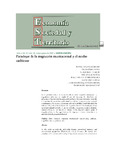
Please use this identifier to cite or link to this item:
http://ricaxcan.uaz.edu.mx/jspui/handle/20.500.11845/156Full metadata record
| DC Field | Value | Language |
|---|---|---|
| dc.contributor | 15139 | - |
| dc.contributor | 120243 | - |
| dc.contributor | 10070 | - |
| dc.contributor | 21440 | - |
| dc.contributor | 170448 | - |
| dc.contributor | 102989 | - |
| dc.contributor | 170381 | - |
| dc.contributor.other | 0000-0002-7441-3233 | - |
| dc.contributor.other | https://orcid.org/0000-0001-5371-6676 | - |
| dc.coverage.spatial | Zacatecas | es_ES |
| dc.creator | García Zamora, Rodolfo | - |
| dc.creator | Pérez Veyna, Oscar | - |
| dc.creator | Foladori, Guillermo | - |
| dc.creator | Delgado Wise, Raúl | - |
| dc.creator | Moctezuma Longoria, Miguel | - |
| dc.creator | Reyes Rivas, Elivier | - |
| dc.creator | Márquez Covarrubias, Humberto | - |
| dc.creator | Rivera Castañeda, Patricia | - |
| dc.date.accessioned | 2017-04-25T15:58:49Z | - |
| dc.date.available | 2017-04-25T15:58:49Z | - |
| dc.date.issued | 2007-05 | - |
| dc.identifier.issn | 2448-6183 | es_ES |
| dc.identifier.uri | http://hdl.handle.net/20.500.11845/156 | - |
| dc.identifier.uri | https://doi.org/10.48779/hcgg-jh66 | - |
| dc.description | In this article we analyse the relationship between international migration and environmental degradation. We analyse the case of Zacatecas. We identify three paradoxes: a) some factors such as ecological degradation, scarcity of natural resources or the pressure due to population growth do not explain international migration; on the contrary the causes can be found in the social unsustainability due to production relationships; b) due to migration, the work force is transformed from being a renewable natural resource to a nonrenewable one, particularly for the socio-economical dynamics of the place of origin, and c) migration can develop the empowerment of organisations of migrants in tasks related to the reversal of environmental degradation. | es_ES |
| dc.description.abstract | En el presente artículo se analiza la relación entre migración internacional y degradación ambiental, se estudia el caso de Zacatecas. Se identifican tres paradojas: a) factores como la degradación ecológica, la escasez de recursos naturales o la presión del crecimiento poblacional no explican la migración internacional; contrariamente, las causas se encuentran en la insostenibilidad social derivada de las relaciones de producción; b) merced a la migración, la fuerza de trabajo pasa de ser un recurso natural renovable a uno no renovable, en particular para la dinámica socioeconómica de los lugares de origen, y c) la migración puede gestar el empoderamiento de las organizaciones de migrantes en tareas vinculadas a la reversión de la degradación ambiental. | es_ES |
| dc.language.iso | spa | es_ES |
| dc.publisher | El Colegio Mexiquense | es_ES |
| dc.relation | http://est.cmq.edu.mx/index.php/est/article/view/244/699 | es_ES |
| dc.relation.uri | generalPublic | es_ES |
| dc.rights | Attribution-NonCommercial-ShareAlike 3.0 United States | es_ES |
| dc.rights.uri | http://creativecommons.org/licenses/by-nc-sa/3.0/us/ | * |
| dc.source | Economía, Sociedad y Territorio, vol. 6, no. 24, pp. 975-994 | es_ES |
| dc.subject.classification | CIENCIAS SOCIALES [5] | es_ES |
| dc.subject.other | info:eu-repo/classification/Zacatecas | - |
| dc.subject.other | info:eu-repo/classification/Migración internacional | - |
| dc.subject.other | info:eu-repo/classification/Sostenibilidad | - |
| dc.subject.other | info:eu-repo/classification/Ambiente | - |
| dc.subject.other | info:eu-repo/classification/Despoblamiento | - |
| dc.subject.other | info:eu-repo/classification/Empoderamiento | - |
| dc.subject.other | info:eu-repo/classification/International migration | - |
| dc.subject.other | info:eu-repo/classification/Sustainability | - |
| dc.subject.other | info:eu-repo/classification/Environment | - |
| dc.subject.other | info:eu-repo/classification/Depopulation | - |
| dc.title | Paradojas de la migración internacional y el medio ambiente | es_ES |
| dc.type | info:eu-repo/semantics/article | es_ES |
| Appears in Collections: | *Documentos Académicos*-- UA Estudios del Desarrollo | |
Files in This Item:
| File | Description | Size | Format | |
|---|---|---|---|---|
| Rodolfo García et al. Paradojas de la migración internacional .pdf | Versión publicada | 3,74 MB | Adobe PDF |  View/Open |
This item is licensed under a Creative Commons License
